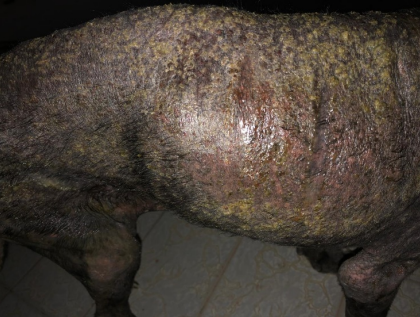Cutaneous candidiasis caused by antifungal-resistant Candida sp. strain in canine individual
DOI:
https://doi.org/10.21708/avb.2022.16.4.10997Resumo
The aim of the current report is to describe a cutaneous candidiasis case affecting a canine individual treated at the University Veterinary Hospital of State University of Maranhão (UEMA), in São Luís City. The patient had three-month history of skin diseases; it had been previously subjected to several treatments based on antibiotics, corticosteroids and antifungal drugs that have failed to show clinical improvements. Dermatological assessment has indicated generalized moist dermatitis, intense skin desquamation, alopecia, pruritus and meliceric crusts along the animal’s body, mainly in its dorsal region. Complementary tests, such as skin cytology and microscopy, trichogram, qualitative PCR and serology for canine visceral leishmaniasis, as well as fungal culture and antifungigram were requested based on this scenario. Serology recorded inconclusive results for leishmaniasis, whereas PCR recorded negative results in the presence of the agent’s DNA. Cytology, microscopy and trichogram results have evidenced fungal infection in the assessed samples. Moreover, mycological culture and antifungigram resulted in the growth of Candida sp. specimens capable of resisting antifungal agents such as amphotericin B, fluconazole, itraconazole and nystatin. The therapy adopted after candidiasis diagnosis confirmation comprised oral doses of manipulated ketoconazole, in combination to topical therapy with shampoo based on moisturizing formulas associated with Miconazole and Chlorhexidine (at 2%), for four weeks. After 30 days, when the adopted therapy was over, the aforementioned animal presented remission of the previously observed lesions and fully improved condition.
Downloads

Downloads
Publicado
Edição
Seção
Licença
Copyright (c) 2022 Acta Veterinaria Brasilica

Este trabalho está licenciado sob uma licença Creative Commons Attribution 4.0 International License.
Autores que publicam na Acta Veterinaria Brasilica concordam com os seguintes termos: a) Autores mantém os direitos autorais e concedem à revista o direito de primeira publicação, com o trabalho simultaneamente licenciado sob a Licença Creative Commons Attribution que permite o compartilhamento do trabalho com reconhecimento da autoria e publicação inicial nesta revista. b) Autores têm autorização para assumir contratos adicionais separadamente, para distribuição não-exclusiva da versão do trabalho publicada nesta revista (ex.: publicar em repositório institucional ou como capítulo de livro), com reconhecimento de autoria e publicação inicial nesta revista. c) Autores têm permissão e são estimulados a publicar e distribuir seu trabalho online (ex.: em repositórios institucionais ou na sua página pessoal) a qualquer ponto antes ou durante o processo editorial, já que isso pode gerar alterações produtivas, bem como aumentar o impacto e a citação do trabalho publicado (Veja O Efeito do Acesso Livre).


 Esta obra está licenciada com uma Licença
Esta obra está licenciada com uma Licença 